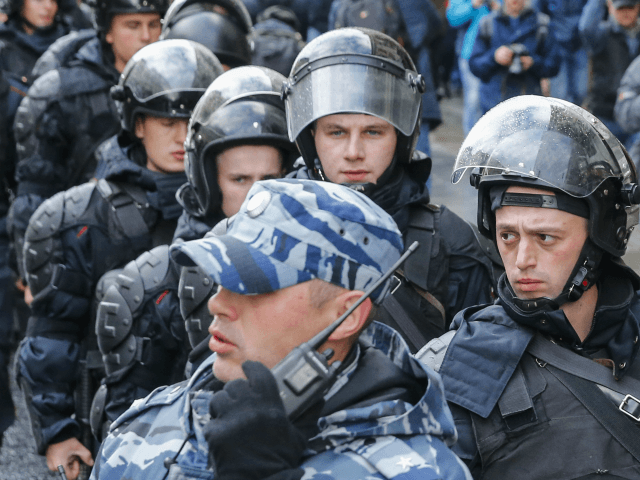Russian police on Wednesday announced the detention of an unspecified number of Jehovah’s Witnesses (JW), along with raids on 16 different properties in the Moscow area. The JW religion was banned as “extremism” by a Russian court order in 2017.
The Moscow Times reported the unnamed detainees stood accused of holding “secret meetings” and studying forbidden “religious literature.”
“In addition, the organizers also held online meetings via video link,” Russia’s major-crimes prosecution authority, the Investigative Committee, said. The detainees could face up to six years in prison, or ten years if they are convicted of “organizing an extremist group.”
The oppression of Jehovah’s Witnesses in Russia has become a subject of great concern for human rights groups. Human Rights Watch (HRW) warned in January that persecution has “dramatically escalated” over the past year, even after Russian President Vladimir Putin said religious persecution is “nonsense” and promised he would “look into” the situation.
“For Jehovah’s Witnesses in Russia, practicing their faith means risking their freedom. There is nothing remotely justifiable about this. It’s time for President Putin to ensure that law enforcement stop this harmful persecution,” Human Rights Watch deputy Europe and Central Asia director Rachel Denber said in January.
“This morning, at least 15 families of believers were awakened by a loud knock on their doors. On television they show how innocent, law-abiding people are being led away in handcuffs. At the same time, no one is able to explain why they are dangerous for the state,” said a spokesman for the European Association of Jehovah’s Witnesses.
The Cato Institute agreed in January that JWs are “targeted for no logical reason” in Russia, comparing their treatment to the persecution of the Baha’i in Iran and the Yazidis in Syria and Iraq.
Cato’s Doug Bandow postulated that Putin’s government treats JW’s so harshly because they tend to be non-conformists who reject absolute government authority over their lives:
JWs are not politically active but tend to irritate governments by refusing to respect symbols of state authority, including flags. They are serious about their faith: thousands ended up in Nazi concentration camps. They also were plaintiffs in two U.S. Supreme Court cases challenging the Pledge of Allegiance (the first upheld the practice; a few years later the high court reversed the earlier decision and blocked the requirement).
In Russia’s case the main issue appears to be the fact that JWs are guilty of “social hostility” in Moscow’s view. The faith is doctrinally odd and poorly understood, while believers form a distinct, even insular community. To some Russians, at least, JWs don’t fit in. Which appears to be the basis for the campaign against JWs and some other groups.
Bandow cited a report from the international JW organization that explained how its members are treated in Russia:
Heavily‐armed police and special forces raid homes of the Witnesses, forcibly entering as if they were dealing with hardened criminals. The authorities often point guns at the heads of the residents — including children, the elderly, and the disabled — and treat them roughly, causing emotional and physical harm. Police confiscate belongings, including Bibles, electronic devices, money, and personal items that have nothing to do with religion.
According to the report, JWs are often detained for lengthy periods before their trials and treated cruelly by their jailers, including physical abuse and outright torture. Forbes noted in 2019 that when Russian courts get around to prosecuting JW detainees, they are rarely accused of any crime other than being a Jehovah’s Witness; since they were classified as an “extremist” organization in 2017, no further details or evidence of dangerous “extremism” is necessary.
The New York Times (NYT) noted in 2017 that not even the Russian Supreme Court ruling that officially branded the JWs as “extremists” bothered to explain why they merited that severe designation.
“In the case of Jehovah’s Witnesses, the putative extremism seems to derive mostly from the group’s absolute opposition to violence, a stand that infuriated Soviet and now Russian authorities whose legitimacy rests in large part on the celebration of martial triumphs, most notably over Nazi Germany in World War II but also over rebels in Syria,” the NYT speculated.

COMMENTS
Please let us know if you're having issues with commenting.